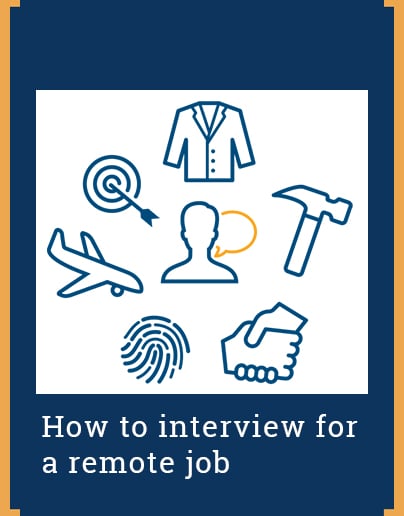Intevity has always been a remote organization. We believe that a company that hires the best talent no matter where they are located, will result in a company that has the best talent available. People who learn about our company's remote nature love the idea of working remotely and often ask us: how do I get that kind of job?

As Senior Manager of Operations, whose job it is to onboard our new remote hires,and after working remotely for ten years myself; I have experience and advice on what it takes to successfully interview for a remote job.
Before you go any further, realize that the irony of remote work is that the reason it is appealing to most people is the same reason it is difficult. The dream, of course, is that you are sitting poolside while the children swim, and you knock out that next segment of code while sipping on Mai Tais. The reality is, you need to lock yourself in your home office to get a deliverable done before the deadline or to be available for a teammate that has questions, while all your friends and family are grilling hamburgers and hot dogs outside your window. You are there - but you are not - and people who have never done remote work will have a real hard time understanding why you can’t just take a break and play. Your children will be knocking on your door, and the dog will be barking while you are trying to take a conference call. You have to learn how to adapt.
I have distilled my interview advice down to seven simple steps. If remote work still sounds appealing to you after the caveat above; please read on.
Step One - Find the Right Remote Job
When interviewing for a remote job, the first thing you need to do is find a legitimate remote company. There are a lot of scams out there. Working from home is the dream for many people, and there are companies like multi-level marketing schemes and other types of predatory companies that prey upon people’s desire to perform remote work. These are the kind of places that you should avoid. If a job asks you to pay for anything up front, that is a red flag and you should immediately walk away. Do your research. Look into what the company does and look up the company’s credibility on sites like Glassdoor.com or LinkedIn.
Also, ask yourself; what is the company’s business model? Jobs like software development and management consulting are both understandable and appropriate candidates for remote work. Afterall, a developer can produce and upload code to a repository to share with others from just about anywhere. And business consultants frequently travel, have clients all over, and don’t necessarily need corporate office space since most of their client time is spent at client sites.
Find a job that not only matches your skillset, but is one that is a viable industry to successfully operate remotely.
Step Two - Be Self- Directed and Disciplined
When interviewing for a remote job, demonstrate that you are self-directed and disciplined. These are the two most critical factors for success in remote work. You don’t have a boss looking over your shoulder in your home office. You don’t punch a time clock. People can’t see you at your desk. It is up to you and you alone to break out your workload for the day and manage it. A developer may get a set amount of tickets to complete for the day, or an Engagement Manager may have a status report to complete, but it is up to them how and when they get it done before the deadline.
You must demonstrate your ability to self-manage, but you also need to do so in a way that adapts to the environment. For example, like any job you need to be prepared for your interview by having work-product assets available to share. Being remote, be sure that your artifacts are easily shareable over email or instant messaging by producing it in a format like PDF. And have stories prepared about how you had to self-manage in a previous position even if it was for a traditional on-location job.
Step Three - Learn the Tools of the Trade
When interviewing for remote work, show that you are proficient with web conferencing and team collaboration tools. Not being in the same space, teams have to be able to communicate with each other and this is increasingly no longer done by phone. Get comfortable using team messaging applications like #Slack, and video web conferencing tools like Zoom, GoToMeeting, or Amazon Chime.
A truly remote company will likely interview you using one of these web conferencing tools. At Intevity, we do all first interviews as a video conference. If you try to join without a web camera, we will reschedule until you have one. Prepare for this. When it’s your time to interview, be sure to arrive for your interview about 5-10 mins early to give yourself time to install any required apps and plugins, and test your webcam, sound, and microphone.
Pro tip: use a headset, or headphones with a microphone. This will help prevent any echoes and diminish unwanted sounds like keyboard typing.
Understand how to share documents using Office 365 or Google Docs, and be able to use wiki tools like Confluence. If you are a developer, understand ticket tools like Jira, and software repositories like Git and Stash.
Technology changes rapidly and there are constantly new apps being produced to help teams collaborate, like Miro (formerly RealtimeBoard). Our teams use Miro as a virtual whiteboarding tool to collaborate on Product Development, and UX Research & Design in an Agile manner. Always be learning what new tools and techniques are available to accelerate team collaboration remotely. If you can bring a tool like Miro to the table when interviewing, it not only shows engagement, but industry knowledge.
Step Four - Present Well (Dress for the job you want!)
When interviewing for remote work, be prepared to be on camera and present yourself professionally. Create a professional work environment and dress like you are going to an office. Presenting well does more than put your best foot forward to get the job, it creates a work-oriented mindset that helps you be successful at the job.
When you are interviewing for a job, people are paying attention to the details. I once had a job applicant join a video conference interview while lying down on their couch. They did not get the job. Set yourself up for success by setting up a dedicated home office space and make sure that your background looks professional. If you get the job, at some point in the future you will have to communicate with clients and even if you are really just working out of your bedroom, they don’t need to see your unmade bed and dirty laundry in the background.
If you can’t dedicate an entire room in your home as office space, at least tuck your space in a corner where you can set up a professional backdrop of your framed degrees and certifications, houseplants, or other office-like paraphernalia. It demonstrates that you take your job seriously, and that you have dedicated space to sit down and work. If you are really in a pinch, you might be able to buy and set up a nice room-divider screen behind you. One new hire simply hung a makeshift curtain behind him to hide the fact that he was working from his kitchen. A simple fix, but it worked.
Dress like you are going to the office. Okay, full disclosure; day-to-day in the trenches, close coworkers may web conference each other with messed up hair and sometimes in our pajamas but never with a client. However, the first day on any job you want to dress for success. Afterall, if you do have to travel to a client site, your employer is going to want to know that you can dress the part of a professional.
Step Five - Be Willing to Travel When Working Remotely
When interviewing for a remote job, demonstrate that you are willing to travel. Remote work is a bit of a misnomer, because in reality it is mostly remote work. A back-end software developer may not have to travel very often, except for training or to talk to a client architect or IT professional. But an Engagement Manager or UX Designer is much more apt to travel regularly to meet with clients and get that critical facetime.
To be willing to travel, you have to do a critical assessment of your life situation. How long does it take you to get to an airport? How fast can you get to a major metropolitan area (where most client meetings occur)? Who watches your children when you are gone? How will you work around children’s recitals, soccer practice, graduations, and the like? Who will take care of your pets? How long can you travel before it negatively impacts your life? How much notice do you need for travel? These are the considerations that you need to get a handle on before dedicating to this kind of work.
Step Six - Be Reliable
When interviewing for a remote job, demonstrate that you are reliable. Even if you manage to talk your way through the interview process, you won’t last long if people can’t get ahold of you and if you miss deliverables and deadlines. This builds on the self-directed point made above, but this is where it is demonstrated. Be available to take calls for standard business hours in the region that you live and consistently deliver what people ask for with a high degree of professionalism. Never give anyone a reason to doubt your professionalism or dedication to the job.
Step Seven - Communicate
When interviewing for a remote job, you must demonstrate that you are an excellent communicator. This is critically important for several reasons. First and foremost, you need to be able to effectively deal with clients. Professional phone, web conference, and email skills are a must. Learn how to write business emails efficiently, grammatically correct, and in a professional tone. If part of your job is to present ideas, learn how to create effective slide decks to deliver complex concepts in a manner that is easily digestible for executives as well as front-line workers. Being remote, the communication that you present through your business artifacts are likely the only way that a client will get to know, understand, and relate to you.
Communicate with your team! Being remote we need to communicate, communicate and then over-communicate. If you are heads-down working on code with your earbuds in, we can’t look over your cubicle and tap you on the shoulder to tell you something. You must be attentive to emails, text messages, communications on internal messaging programs, and always make scheduled meetings. If you do need to step away from your desk, again communicate this to your team. Keep your calendar updated so people know when you are out-of-office, put OOO notices as your IM status, put away reminders on emails. Let people know ahead of time when you will be gone, when you will be back, and who to reach out to in the meantime.
Good Luck!
If you are truly passionate about embracing a work-life balance and you have the discipline and drive to work from a remote location, the rewards of remote work are tremendous. It’s not always easy, and you need to match to a company that shares your values and professional vision. If you have skills in software development, user experience design, or management consulting you can always check out the available careers and give us a try.


